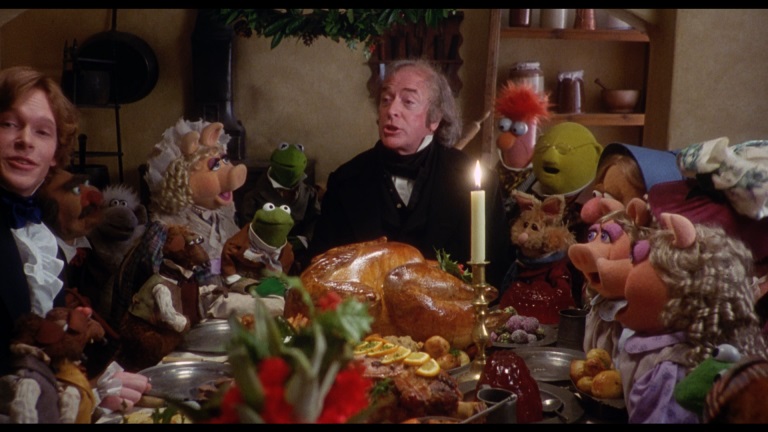
The first thing to understand about The Muppet Christmas Carol is that it is—as Ethan Warren brilliantly argues in a classic thinkpiece at Bright Wall/Dark Room—the best adaptation of Dickens’ classic short story. The second thing to understand is that the film is a product of a serendipitous convergence of factors.
First-time feature director Brian Henson, acting as caretaker for his late father Jim Henson’s vision in the first Muppet film since the elder Henson’s death, was poised to do an all-out parody of Dickens’ work when—in a flash of the kind of mad insight that sometimes comes only under crushing creative pressure—he realized that the legacy of both men could be better served by a relatively faithful adaptation incorporating a key dimension of Dickens’ work omitted in all previous versions: Dickens’ narrative voice. Casting Gonzo against type as a straight-man Charles Dickens, with Rizzo the rat as a skeptical Greek chorus, was the perfectly Muppety solution. None of this would have worked without Michael Caine’s determination from the outset to “play this movie like I’m working with the Royal Shakespeare Company. I will never wink, I will never do anything Muppety. I am going to play Scrooge as if it is an utterly dramatic role and there are no puppets around me.”
The final piece of the puzzle—and the one that warrants its inclusion in the A&F Top 25 Musicals list—is songwriter Paul Williams’ recovery from a decade lost to substance abuse at just the right moment to capture both the darkness and the awakening of Ebenezer Scrooge’s spiritual journey. Williams (of “Rainbow Connection” and “Movin’ Right Along” fame) drew on his own experiences of lostness to capture Scrooge’s isolation (“When a cold wind blows it chills you, chills you to the bone / But there’s nothing in nature that freezes your heart like years of being alone”) as well as his 12-step reliance on the higher power he calls “the Big Amigo,” to whom Tiny Tim’s heartfelt prayer is addressed (“Bless us all, that as we live / We always comfort and forgive … We reach for You and we stand tall / And in our prayers and dreams, we ask You / Bless us all”). And, of course, Williams’ gratitude overflowed into Scrooge’s redemption song, “Thankful Heart.”
What stands out is the startling convergence of Dickens’ fantastical humanism and celebratory sentimentality with the Muppet sensibility, particularly as it emerged from Henson and Williams’ first collaboration in The Muppet Movie, with its blend of blend of generosity of spirit and absurdism. No human actor could evoke the decency of Bob Cratchitt more immediately than Kermit the Frog.
Unhappily, one notable song, “When Love Is Gone,” was cut from the theatrical version of the film at the behest of Disney studio chief Jeffrey Katzenberg, who felt that it was too slow and mature for young viewers. This poignant breakup song, sung by young Ebenezer’s lost love Belle, unexpectedly becomes a brief duet with old Scrooge—and, crucially, sets up the brief “The Love We Found” reprise at the denouement. To date, this deleted scene has been made available only in the 90-minute full-screen edition of the song on some DVD editions or as a bonus feature, although there are indications that it may be restored to a future restored version of the widescreen film.
— Steven D. Greydanus (2022)
- Directed by: Brian Henson
- Produced by: Martin G. Baker; Brian Henson
- Written by: Charles Dickens; Jerry Juhl
- Music by: Miles Goodman
- Cinematography by: John Fenner
- Editing by: Michael Jablow
- Release date: 1992
- Running time: 85 minutes
- Language: English
Arts & Faith Lists:
2022 Top 25 Movie Musicals — #18
2025 Top 100 — #95